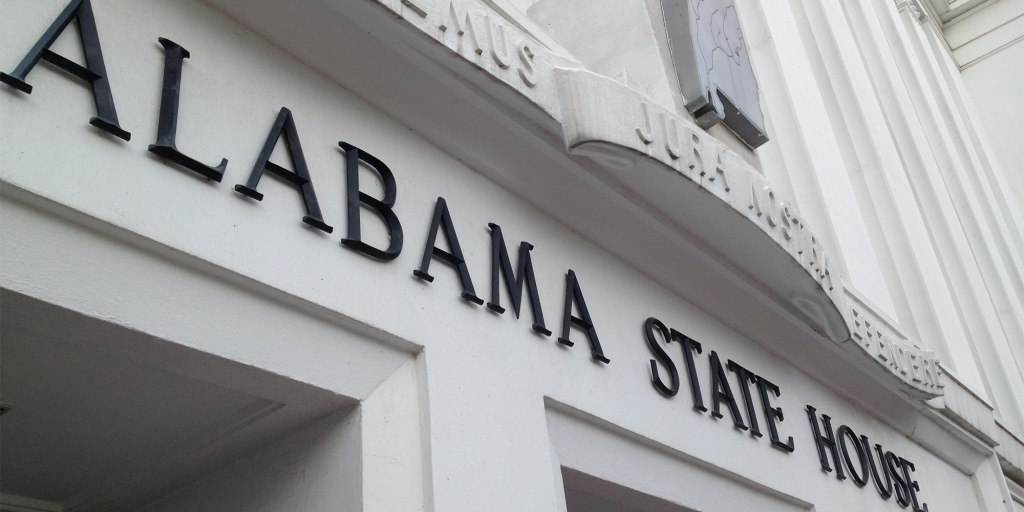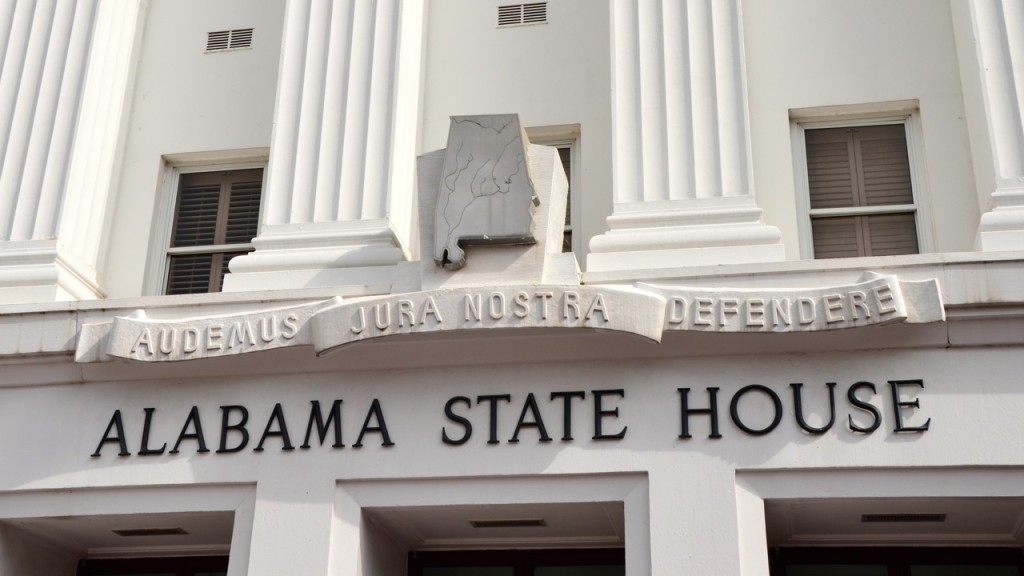Alabama governor, education board OK charter school commission

The Alabama State Board of Education confirmed a list of appointed nominees on Tuesday for the state’s new charter school commission. Gov. Robert Bentley, who is president of the board but rarely attends meetings, made a surprise appearance. He said he attended after it became clear the board couldn’t make a quorum without him. “This was put in legislation and we need to get the board in place and so I felt like we needed a quorum so I came over to make a quorum and chair the meeting,” he said. Earlier this month, the board angered members of the Alabama Legislature by refusing to confirm the commission, which is designated with hearing appeals of charter school applications rejected on the local level. Earlier this year, Bentley and the Legislature approved a plan to allow charter schools. According to the law, the commission is appointed by the governor, lieutenant governor, House speaker and Senate president pro tem. The nominees then must be confirmed by the state board. The delay had prompted Republican Rep. Terri Collins of Decatur to introduce a bill that would cut the state board out of the confirmation process. Several board members who contested the first confirmation vote were absent on Tuesday because of funerals or illnesses. “I think they need a place,” Bentley said of the board. “They need a board that people can apply to and bring their grievances to, so I think a board being in place is important and I think it is good for the process.” Hours later, Collins withdrew her bill from the House calendar. State Superintendent Tommy Bice said the board will serve the commission as administrative support. “I know there are some members that may have differing opinions and that’s why we have a board,” he said. “Everybody’s not expected to show up and have the same opinion, so it was voted on today, it’s done now, we have the commission and we look forward to working with them.” Bice said the majority of the state’s charter school structure will not involve the commission, but because the BOE oversees K-12 education it’s important for it to stay involved in the process. “I mean, at the end of the day, the implementation, of the charter bill law rests with the state department of education,” he said. “We’re putting together the regulations; we’re putting together the implementation procedures, all those things associated with it, even with this commission.” Board member Ella Bell, who said she was absent for the funeral of her longtime friend and campaign manager, said she was glad the governor attended. “They are his people,” Bell said. One of the board members who voted was Mary Scott Hunter. Hunter said she’s heard other states also have had early difficulties in creating charter schools, but expects future votes will be “more normalized.” “I certainly can see why it was filed,” she said of the bill Collins sponsored. “It was filed as an insurance policy against this board not getting the vote that it needed. But now this board has gotten the vote that it needed, in the normal course, and has shown that it can get this done.” Republished with permission of The Associated Press.
Robert Bentley announces increased grants for VPK programs
Tuesday afternoon Gov. Robert Bentley issued a news release touting his administration’s efforts to increase funding for Alabama’s voluntary prekindergarten programs — recently called one of the nation’s best — amid an ongoing budget deficit looming in the state budget. “The most important part of a child’s education is a good, solid foundation at a young age, and our First Class voluntary pre-k program provides that,” Bentley wrote in a prepared statement Tuesday. “All children, regardless of where they live, deserve the opportunity to excel. A high-quality, voluntary pre-k program improves their chances of success in school long-term. This is a wise investment that will benefit children and families throughout Alabama.” After the Legislature’s approval of a state education budget, the governor highlighted ongoing issues with access to VPK programs, which sags below national averages despite the recent national success. “Demand for these grants has far exceeded our supply,” Bentley said in a release. “Only 13 percent of Alabama’s four-year-olds are currently enrolled in the First Class program and that is the reason we need to continue expanding access to this program. It is my goal to give more families the option of enrolling their children in voluntary pre-k, and I will continue my efforts to expand access to First Class even more,” the governor said. Budget talks are expected to continue until near the end of the Regular Session, scheduled for June 15. Major top-line spending levels will depend on the resolution of a deal on gaming, on which there are currently competing proposals. Sen. Del Marsh has promulgated a proposal that would provide for a state lottery and the opening of new gambling facilities to help raise revenue. The Poarch Creek Indian nation, meanwhile, has offered to cover the projected budget hole in exchange for exclusive gaming rights throughout the state. Bentley has asked the Legislature for a series of tax increases, including on cigarettes a proposal which has led to discussion of changing the way all vices are taxed in special session. So far talk of taxes have proven unpopular among rank-and-file lawmakers in the Statehouse though Speaker Mike Hubbard has joined the Governor in his efforts.
Lawmakers approve state education budget

The Alabama Legislature has given final approval to the education budget that expands the state’s prekindergarten program. The House of Representatives on Tuesday unanimously approved a conference committee agreement on the spending plan. The budget now goes to Gov. Robert Bentley for his signature. The budget steers an additional $10 million to the state’s prekindergarten program. The increase is projected to enable another 1,800 4-year-olds to attend the public preschool program. House Education Budget Chairman Bill Poole said the budget makes classroom spending a priority. The budget does not include raises for state teachers. Alabama lawmakers are still working on the state’s other budget. The General Fund budget could include funding cuts to state agencies unless lawmakers agree on new revenue sources. Republished with permission of The Associated Press.
Plan for earmark-free state budget passes Senate panel

A bill by Sen. Gerald Dial to unify the Alabama general fund and education budgets moved forward in the Senate Tuesday, as the finance and taxation committee gave a favorable report to Senate Bill 502. The proposal would allow voters to decide whether to establish a single state budget and remove any recommendations or limits on how funds within that budget should be spent. During the committee meeting Tuesday, Dial said that without the practice of earmarking, or placing limits on how funds are spent within the budget, Alabama lawmakers might have a different set of funding decisions to make this session. “I’ve heard it said that one of the problems we’ve got in this state is that we’ve got earmarking,” Dial said. “We’ve got almost $3 billion in Heritage Trust Fund. Just think what we could do (with that money). Without earmarks, there’s enough funding in this state to fund government for more than five or 10 years.” With just five days left in the regular session, lawmakers may run out of time to pass SB 502 this year. However, House Speaker Mike Hubbard has already announced plans to form a Commission on Earmarking and Budget Reform to study the state budget process, including earmarking, appropriations, spending oversight, and the fact that Alabama is one of only three states with two separate budgets. In a prepared statement issued Monday, Hubbard said the commission will make recommendations “to provide much-needed flexibility in the budgeting process.” That commission is expected to issue its findings before the start of the 2016 legislative session.
Tax proposal would cover most common adult vices

Alabama Today has learned that Rep. Jack Williams is looking into a way to restructure state statutes that govern materials deemed for adult consumption only, such as alcohol and tobacco, to include pornography and institute a tax on them going into the Special Session on budget. It’s not possible to tax pornography individually since such material can’t be taxed based on content. However, a restructuring of materials for adult consumption would allow one tax in statute for anything that requires proof of being older than 18. NBC News last year reported on the profitability of pornographic materials, “Globally, porn is a $97 billion industry,” according to Kassia Wosick, assistant professor of sociology at New Mexico State University. Between $10 billion and $12 billion of that comes from the United States. Revenue from traditional porn films has been shrinking, though, because of piracy and an abundance of free content on the Internet. Williams said he’s “Not willing to tax Pepsi if I’m not going to tax Playboy and Penthouse, too,” a reference to another tax proposal that is being discussed. Whether such a proposal will make it and how other members would support it remains to be seen. Alabama Today will continue to add updates to this proposal and others as they’re floated and introduced.
Donna Marietta: The Forgotten Generation

Seniors are often the forgotten generation. As we go about our daily lives, we forget there are many seniors who live alone and are lonely and isolated. Many of them are also hungry. As we drive through our neighborhoods on our way to work, school, church or to go shopping, we drive past homes where seniors live behind closed doors and closed blinds. Senior hunger is a hidden national crisis that will only become more serious. In 2030, more than 20 percent of Americans are expected to be older than 65. There is an army of baby boomers who have not saved enough given how long they are going to live, marching towards retirement. It’s going to be a hungry retirement! Many have not recovered from the recession poorly timed for people nearing or already in their retirement years. The number of seniors facing the threat of hunger is alarmingly high. More than 1 in 6 seniors in America – a total of 8.8 million — may not know when they will have their next meal or where it will come from. In 2050 that number – 8.8 million – is predicted to double. There are many reasons for the rapid increase in life expectancy, including improved medical care and healthier life styles. Since people are living longer, we also are seeing more frail elderly. The frail elderly segment of our population is growing faster than any other category. Frail is defined as a state of decreased physical functioning and/or bad complications of aging such as poor balance that increased the risk of falls, fractures or disability. No one grows up dreaming of becoming isolated, hungry, and alone. Sometimes it is beyond their control, such as outliving a more mobile spouse and are now vulnerable or outlasting a pension or their retirement funds. Women make up 60 percent of the seniors facing the threat of hunger. Many seniors who can afford the cost of food, lack the mobility to get the food and prepare their own meals nor have anyone to help them. They may have no family nearby or their friends aren’t able to help because they may be in the same situation. Some seniors are too proud to let others know they are hungry. They are humiliated and don’t want to be a bother. They want so much to stay in their home that they’ll go hungry without a fuss. They are afraid they’ll be forced into assisted living or a nursing facility. They are getting by on cold cereal, or the wrong kind of food but that is not adequate. It is vital that they receive the proper nutrients to stay healthy. Half of all health concerns affecting older Americans are directly connected to poor diet. A recent study showed that food insecure seniors are at higher risk of experiencing negative nutrition and health consequences. Specifically, seniors at risk of hunger are: 50 percent more likely to be diabetic; Twice as likely to report fair or poor general health; Three times more likely to suffer depression; Nearly 60 percent more likely to have congestive heart failure or experience a heart attack; and Twice as likely to report having gum disease or asthma. These are some of the reasons for the Montgomery Area Council On Aging and the Meals On Wheels program. Through donations and volunteers, we are able to deliver hot, nutritious meals Monday through Friday to home-bound seniors. At this time we have the funds and volunteers to be able to deliver 350 meals daily. There is a waiting list that averages about 400. Enabling seniors to stay in their own homes means they remain happier, extend their independence, and can stay connected to the community and surroundings that provide them comfort. Meals On Wheels is more than a meal. It is a friendly smile and conversation, and it provides peace of mind. The smile and daily check is a critical part of our mission because many times our volunteer may be the only person that the senior sees each day. The compassion delivered with the meal allows Meals On Wheels to show our home-bound seniors they are not forgotten and that we care. Donna Marietta is executive director of the Montgomery Area Council on Aging, a nonprofit that provides senior services to five counties in central Alabama.
Budget deal still elusive in final days of regular session

Alabama Today is hearing that as we round out the end of the Regular Legislative Session the plan is to be in session two days this week, three days the next week, then skip a week, and finish the week after that. Then, of course, it’s looking like a Special Session is inevitable to address pending budget proposals. This schedule has not been finalized but is what members and staff are talking about. The Legislature is no closer to reaching a budget deal that both the House and Senate will pass than all session, and they might as well be worlds apart. Thanks to some strong-willed and principled members in the House they weren’t able to bring to a floor vote the tax increases Gov. Robert Bentley and Speaker Mike Hubbard wanted. It doesn’t look like that’s going to change in the next several weeks. That doesn’t mean the discussion about those issues or new ones are dead. We’re hearing lots of talk about possible tax proposals for the Special Session, including a soda tax. Despite loud protests to the contrary, the budget passed by the House was not intended to be the final version. It was the House punting to the Senate, so the governor can breath easier and put his veto pen down for a moment. Check back for updates on the schedule and proposals to solve the budget crisis.
Kenneth Paschal: Government needs to stop hurting Alabama families

Parental rights in Alabama are under assault. These fundamental rights are consistently treated as “ordinary” by federal and state government, which essentially provides government with unlimited power to undermine the family unit. We all know laws and the court system are intended to protect citizens, but when it comes to families, husbands and wives, and fathers and mothers, laws and their enforcers can sometimes become harmful instigators. This harms children, parents, families and society. Power over the family unit is best placed in the hands of the parents not government. In 2011, Senate Joint Resolution 65 (SJR 65) was approved by the Alabama legislature, which requires proper proof of harm before the government will intervene in parental decision-making. (As acknowledged by the U.S. Supreme Court in Wisconsin v. Yoder (1972), that held, “The primary role of the parents in the upbringing of their children is now established beyond debate as an enduring American tradition.”) The signing of SJR 65 sent a strong message to Washington. The state of Alabama acknowledged the fundamental right (God-given) of parents (meaning, granted by God and cannot be take away without compelling reason) to direct the upbringing and education of their children, is protected by the Alabama and U.S. constitutions. The Alabama Supreme Court has declared parental rights are fundamental in prior rulings; however, the Legislature has never before defined the level of protection granted to parents. I am appreciative of our Legislature and governor for publicly announcing to citizens a defined standard in SJR 65, “the right of the parents to direct the upbringing and education of their children is a fundamental right protected by the Constitution of the United States and the state of Alabama”. Because SJR 65 is not codified in Alabama statutes, the result of such failure to “Secure Parents’ Fundamental Rights” is allowing the courts and other state agencies to routinely over-reach their responsibilities. Examples include a court order stating parents are not allowed to have a glass of wine during dinner; parents not allowed to send their children to church on Wednesdays; discontinuation of homeschooling of a teenager based on an argument that he needed more diversity; a 14-year-old is not required to share health information with his or her parents. This is why Senate Bill 135 and House Bill 213 were filed this year and why they are so important to Alabama’s families. They would protect parents’ fundamental rights (God-given) in Alabama. We need to strongly urge our Legislature to increase the protections of family values by declaring in this State, what they have already declared to the U.S. Congress, any political subdivision of the state, or any other governmental entity or institution shall not infringe upon the fundamental rights of fit parent’s to direct the upbringing, education, and physical and mental health of his or her minor child subject to strict scrutiny without demonstrating a compelling governmental interest, as applied to the child involved, is of the highest order, and the same is narrowly tailored in the less restrictive manner. SB 135 and HB 213 have seen opposition from the divorce industry and Alabama Association of School Boards. SB 135 is assigned to the Human and Health Services committee and chaired by Sen. Gerald Dial, a Republican and a Baptist. HB 213 is assigned to the House judiciary committee and chaired by Rep. Mike Jones, a Republican, family law attorney, and a deacon of his church. Both bills have seen support from across the state and country to include the Homeschool community and the Alabama Federation of Republican Women (AFRW). AFRW passed a resolution in support of Parental Rights in Alabama during its Legislative Days event April 1 and 2. Citizens of Alabama have requested weekly that Dial and Jones place these bills onto their committee agenda. The Alabama citizens’ requests so far seems to fall on deaf ears. I encourage everyone reading this to write and call their members as well as committee chairmen Dial and Jones to ask them to support these bills and bring them up before the session comes to an end. Retired Army 1st Sgt. Kenneth Paschal is the director of governmental affairs of the Alabama Family Rights Association. Information on the organization and its efforts can be found here.
Common Core opponents to rally Wednesday at Statehouse

In an email to statewide grassroots leaders opposed to Common Core organizers announced that activists will rally Wednesday at the Statehouse. The group will hold a press conference and members have been encouraged to meet with their legislators one-on-one. The Senate is expected to vote on Senate Bill 101 on Tuesday and the group hopes if it is brought up it will pass. On Wednesday it will be looking to the House to take it up. Who: Various groups from cross the state Speakers: Sen. Rusty Glover, Rep. Bob Fincher, Stephanie Bell, Dr. John Killian, Troy Towns, Dr. Lou Campomenosi What: Asking the House to take up Senate Bill 101 When: 11 a.m. Wednesday Check back for updates on the event from group organizers as Tuesday progresses, and they are able to see whether Sen. Del Marsh allows the bill to come to a vote and the results of such a vote.
Alabama legislative agenda preview: May 26-28

Tuesday will be the 25th Legislative Day for Alabama lawmakers, leaving just five more days for the legislature to pass a general fund budget. Sen. Gerald Dial has filed a constitutional amendment to unify the education and general fund budgets for future years in an effort to solve the long-term imbalance in funding between the two funding pools. While an earlier proposal filed in the Senate would allow the two funds to share growth revenue, Senate Bill 502 would create a single budget without any earmarks for specific programs or budget items. The Senate finance and taxation panel is expected to vote on the proposal on Tuesday at 1:00 pm. We may see more news from the Senate on Tuesday as Senate President Pro Tem Del Marsh confirmed plans to bring his lottery and gaming proposal to the floor for a vote. House members are scheduled to vote Tuesday on House Bill 664, a plan from Sen. Jabo Waggoner to allow members of the Alabama Public Charter School Commission to be appointed by the Governor, Lieutenant Governor, President Pro Tempore of the Senate, and the Speaker of the House of Representatives rather than the state board of education. According to the House special order calendar, members are also scheduled to vote Tuesday on bills to allow age-appropriate sexual abuse awareness programs in public schools, establish greater protection for victims of domestic violence, and a measure to block abortion clinics from operating near public schools. Here are a few of the items on committee agendas this week: … The House Judiciary committee will consider two bills this week to strengthen civil rights protections in the LGBT community. On Tuesday, the panel will hear public comment on House Bill 657, companion legislation to a proposal filed last week by Sen. Del Marsh to ban employment discrimination on the basis of gender expression, gender identity and sexual orientation. The next day, lawmakers will hold a public hearing on House Bill 615, Rep. Chris England’s proposal to establish civil rights protections against any discrimination based on sexual orientation, gender identity, or familiar status. … The House committee on public safety is scheduled to vote on House Bill 261, the companion bill to Senate Bill 468, also known as the Alabama Dog Tethering and Outdoor Shelter Act. Rep. Steve McMillan brought the bill to make it illegal for dog owners to tie their pets to stationary objects and says that any pet kept outside must have adequate food, water, and shelter.

